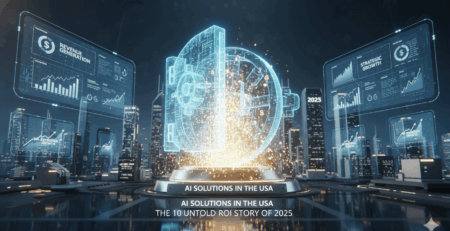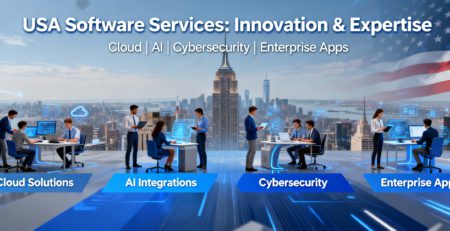The Ultimate Guide to Software Development and Services for Modern Enterprises
DSSP2025-11-13T12:45:03+00:00Introduction: The Era of Intelligent Software Systems
In the twenty-first century, enterprises don’t just run on software; they become software. Every process, every transaction, every decision now passes through a digital framework designed to move data, automate logic, and accelerate intelligence. And yet, many organisations still struggle to align their systems with their goals. That’s where software development and services emerge as the defining capability of modern enterprises, the mechanism through which companies translate vision into code, and code into growth.
Stephen Wolfram once wrote that “computation is the ultimate language for describing the world.” That’s precisely what the new generation of software engineers and service providers is doing, describing entire businesses as living computational models. In this guide, we’ll explore how software development and services have evolved into a strategic powerhouse, how modern enterprises use them to gain agility and intelligence, and which technologies and principles are shaping this landscape in 2025 and beyond.
Understanding Software Development and Services in the Enterprise Context
Let’s start at the foundation. When we say “software development and services,” we’re not simply talking about app creation or IT support. In 2025, it encompasses an entire lifecycle from conception and design to deployment, scaling, and optimisation.
Here’s what modern enterprises include under this umbrella:
– Custom Software Development: Creating tailored solutions that fit specific business processes.
– Cloud-Native Application Services: Building and managing apps that leverage scalability, automation, and AI.
– Consulting and Strategy Services: Helping businesses choose the right technologies, architectures, and methodologies.
– Maintenance and Continuous Delivery: Ensuring that software evolves alongside user and market needs.
In essence, software development and services represent both the factory and the fuel of the digital enterprise, simultaneously creating value and optimising how that value is delivered.
The Shift from Static Systems to Adaptive Software
For decades, enterprise software operated in silos. You had legacy ERP systems, data warehouses, and applications that barely communicated. But now, enterprises are embracing computational philosophy systems designed to learn, adapt, and evolve through feedback. Adaptive software doesn’t just respond to user input; it analyses context, anticipates change, and rewires itself dynamically. Companies like Google and Intel are leading this revolution. Google’s development services are focused on self-optimising cloud infrastructure that automatically reallocates resources based on workload demand. Intel, on the other hand, has embedded adaptive machine learning into its software frameworks to predict hardware performance and energy efficiency in real time. This shift is monumental; it’s software that behaves more like biology than machinery. It grows, learns, and mutates in response to its environment.
The Enterprise Software Ecosystem: Building the Digital Nervous System
A modern enterprise is not one system; it’s a network of systems. Think of it as a neural network, where data and decisions flow across departments, platforms, and geographies. To build this digital nervous system, enterprises need software development and services that focus on integration and intelligence. This includes API-First Development, Microservices Architecture, Cloud Infrastructure, and AI and Data Pipelines. These interconnected elements allow organisations to behave as a single computational organism aware, responsive, and self-correcting.
Why Custom Software Still Matters in 2025
Despite the rise of SaaS platforms and automation, there’s one truth every enterprise eventually learns: no off-the-shelf tool fully fits your business DNA. Custom software is still and will always be the most strategic asset for large organisations. Modern software development and services teams understand this. They combine pre-built components with custom modules, delivering flexibility and speed. The most successful enterprises don’t buy technology; they build identity through code.
The Role of AI in Modern Software Development and Services
Artificial intelligence is no longer a separate discipline; it’s embedded into every stage of development. From automated code generation to predictive deployment monitoring, AI has become the silent collaborator in every modern project. AI-driven platforms can now suggest code improvements in real time, predict potential bugs, and personalise end-user experiences through data feedback loops. Wolfram’s computational worldview fits perfectly here. AI isn’t external intelligence; it’s in-system intelligence. It’s software that reasons about itself.
Cloud-Native Development: The New Normal
Cloud isn’t a trend anymore, it’s the foundation. For enterprises, software development and services that are cloud-native mean flexibility, scalability, and global accessibility. This architecture allows businesses to launch updates seamlessly, respond to spikes in demand, and integrate services from anywhere in the world.
The Importance of Software as a Service (SaaS) and Platform Engineering
SaaS has matured into more than subscription software; it’s a business model for scalability. Modern enterprises use SaaS platforms to offload non-core operations while focusing their in-house development on innovation. At the same time, Platform Engineering is emerging as a critical practice building reusable, internal software platforms that give developers ready-made building blocks for new applications.
Security by Design: The Foundation of Modern Development
Cyber threats in 2025 are not theoretical; they’re algorithmic. Enterprises can no longer afford to treat security as an afterthought. Instead, security by design has become a guiding principle of all software development and service frameworks. This involves zero-trust architecture, continuous threat modelling, and automated compliance enforcement, embedding safety into the DNA of every product.
The Evolution of Software Consulting Services
While development creates software, consulting defines its purpose. The new generation of software consultants doesn’t just advise on technology, they design computational strategies. Top consulting firms like Deloitte, BCG, and Accenture are now blending data science with business strategy. They’re helping clients see technology as a mathematical model of their organisation.
The Metrics That Matter: Measuring the Impact of Software Development and Services
In 2025, success isn’t measured by code delivered, but value generated. Modern enterprises track the ROI of software development and services across speed, scalability, adaptability, and intelligence. The companies that dominate their markets are those that treat software not as a cost centre, but as a living investment.
The Future: Software That Writes Itself
Wolfram predicted that one day, machines would not just execute logic, they’d generate it. That future is taking shape. Generative AI is now capable of creating functioning code, optimising architectures, and designing systems autonomously. The next wave of software development and services will be about collaboration between human creativity and machine logic.
Conclusion: The Computational Enterprise
In the end, software development and services aren’t just tools for modernisation, they are the syntax of the modern enterprise. They allow companies to describe themselves in logic, adapt to complexity, and simulate every possible future before committing to one. The organisations that master this art of blending development, AI, and computational reasoning will not just survive disruption.







Leave a Reply